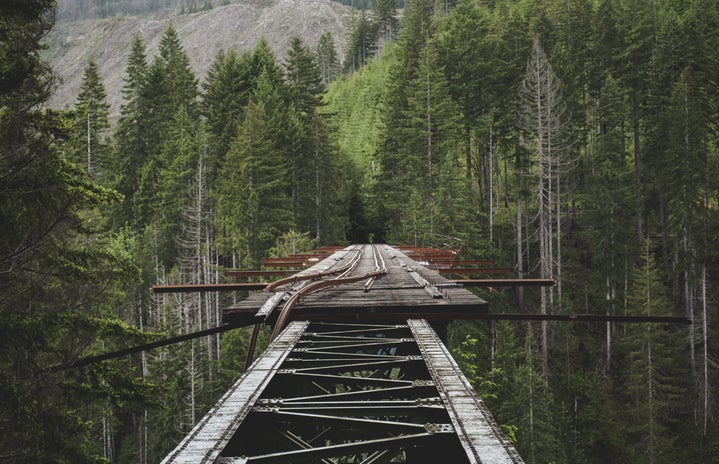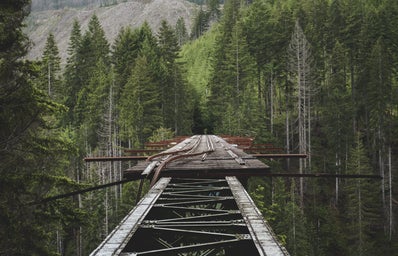There you stand,
alone and forlorn,
railroad ties jutting out
into the morning fog.
At 347 feet,
you are nothing short of awe-inspiring,
and are everything and more
that I had hoped you would be.
I traveled three hours to see you
but know that every second was worth it,
as I run to your head,
eager to climb and walk
across your impermissible beams.
Visitors are forbidden:
this is more apparent than ever,
as I scan the mess of barbed wire
that they so cruelly wrapped around you…
it caresses you in a painful embrace.
Others before me
have climbed your steep concrete end,
a whopping 20-something feet in the air.
They have tied a greasy rope to the ledge
and have leaned plywood against this wall,
nothing short of a disgrace,
but nevertheless necessary.
I sigh and grip the rope tightly,
my stiff biceps quaking
as I painstakingly scale your head.
My best friend laughs,
as she grabs my sweaty hands to help,
both of us shocked
at the unexpected perils of our day.
As we walk across your treacherously dilapidated beams,
our legs shake with fear as we realize
both the sheer height of your deck
and the unsteadiness of our feet.
We gingerly sit down
to marvel at the view before us
as the midday sun beats down.
Previous adventures pale in comparison to this one,
and no picture could ever do you justice.
You stand proud
like a precious time capsule,
untouched for countless decades:
left behind.
You lure explorers from far and wide
with promises of irreplaceable views
and feelings of nostalgia.
People have fined
and people have died
fighting over the ever-present legalities
that are to be expected
of such a dangerous architectural wonder.
Oh what I would give
to see your proud trestles
glistening once more.
But alas,
I am left to reminisce.
A few fun facts about Vance Creek Bridge:
1 – VCB was built in 1929 by the Simpson Logging Company, and was de-commissioned in the 1970s. as the Olympic peninsula logging industry declined.
2 – The bridge didn’t gain tourist popularity until 2010, and many of the railroad ties were removed in 2016 to deter visitors. Green Diamond has no intention to either demolish the bridge or restore it, as demolishing it would destroy the canyon banks, and restoring it would be too expensive. However, there is an ongoing effort to collaborate with WA State Parks and a local bungee jumping company to either turn it into a (safe) tourist attraction or lease it and convert it to a bungee jumping destination.
3 – As mentioned above, it is 347 feet high, and it is also 827 feet in length.
4 – It is the second-highest railroad bridge in the United States and is on the Historic register.
5 – The highest is its “cousin,” the nearby High Steel Bridge, built by the same company! It was renovated and converted to a car-accessible bridge decades ago, and is legal/safe to walk across, if you would like to visit a safer alternative to VCB.
Disclaimer: I do not encourage anyone to visit/walk on Vance Creek Bridge, especially as it has become more dangerous since I visited several years ago. It is on Private Property (owned by Green Diamond) and you risk a minimum $150 fine by walking on or near the bridge. Visit at your own risk and at your own discretion!


